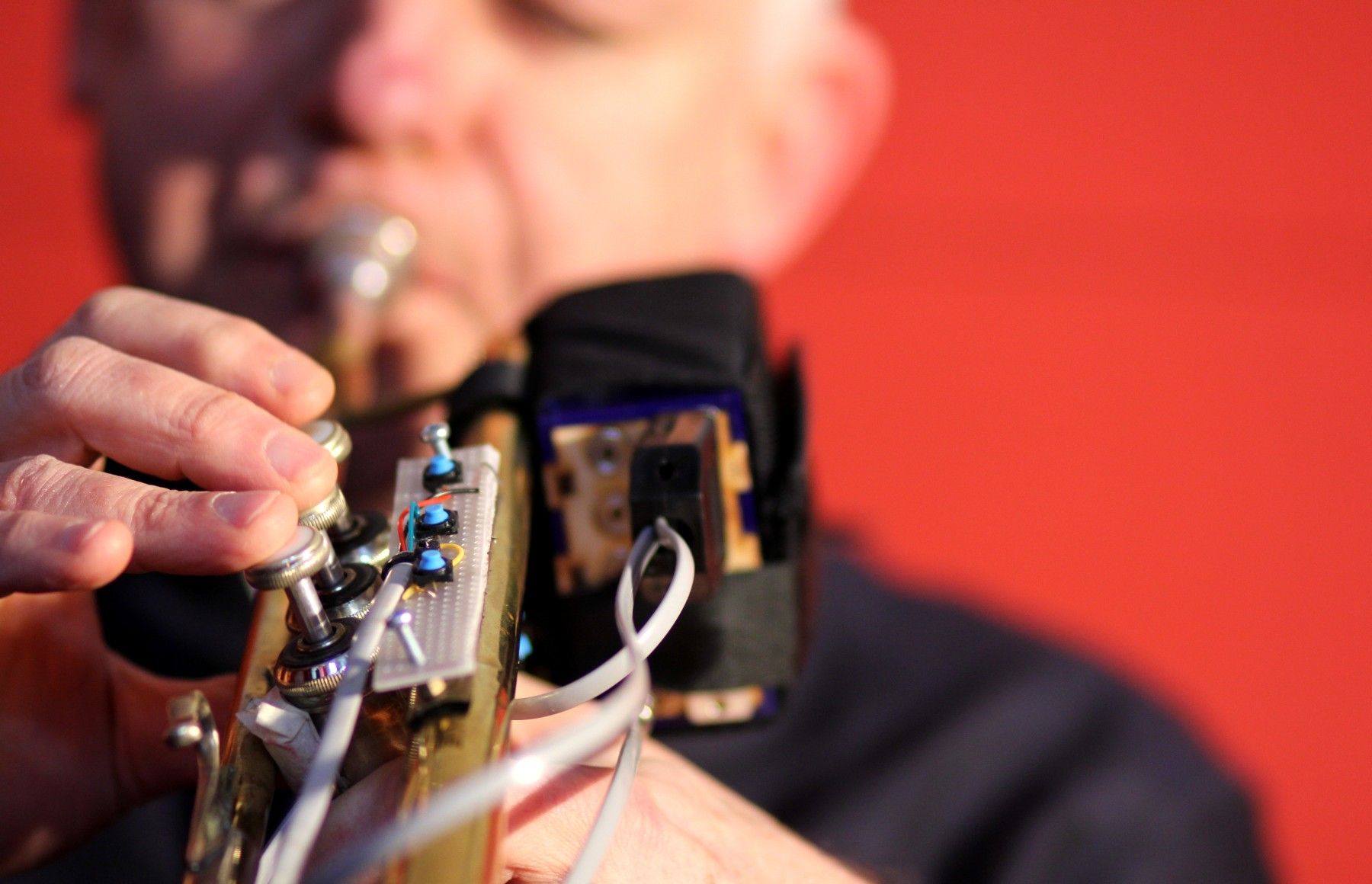MED hall
Location: MED building hall
Route des Noyerettes, EPFL
Free admission
The second concert taking place in the framework of the Musica ex Machina: Machines Thinking Musically exhibition is presented by Jonathan Impett, Director of Research at the Orpheus Instituut in Ghent and co-curator of the exhibition. The audience is invited in an exploratory performance in which ten performers, installed at tables around the space, play, manipulate or interact with experimental means of music creation.
- On this occasion, the Musica ex Machina exhibition at Pavilion B will remain open until 7 pm
Music is often seen in a binary state of human or mechanical. In the context of the current exhibition Musica ex Machina, artist-researchers from the Orpheus Institute, Ghent (BE), explore the space in between. They present new and extended instruments, novel interfaces, repurposed everyday objects and the space itself. We experience the interplay of musicians and algorithms, from the mechanical to AI, in composition, improvisation and installation, to probe the inherent technicity of music and music-making.
Programme
Sound installations | 19h–19h30
-
Simon Waters – Line
Line critiques current notions of immersivity, localising and physicalising sound across a single line of loudspeakers to enhance its ‘comprehensibility’. Algorithmic structures afford intimate engagements with musical time at every scale from the micro-sonic to the historical.
-
Nicolas Collins – Long Fetch
The four microphones in Long Fetch switch from speaker to speaker as soon as they start to feed back, producing pitches that vary with the distance between mike and speaker. These musical patterns respond to sounds in the room, both ambient and performed. The algorithm («turn off, change channel, turn on») is simple, but the result is elegantly complex.
Performances | 19h30–21h
-
Nicholas Brown – Bellfounding
Nicholas Brown will perform excerpts from his Bebung Project, a series of compositions for the electroacoustic clavichord he designed and built in 2023. The set includes Bellfounding (2024), which uses machine learning to reimagine William Byrd’s sixteenth-century keyboard piece, The Bells.
-
MTT with Matthew Wright – Five interventions derived from Frederic Rzewski — Second Structure (1972)
Rzewski’s Second Structure was composed for the innovative improvisation group Musica Elettronica Viva in 1972. It plays with phenomena of memory, listening, imagining and planning to dissolve clear distinctions between composition and improvisation. Four ‘off the shelf’ technologies – turntable, dj mixer, Ableton Live software and multichannel interface – are used to sample the live performers. Wright’s approach is partly influenced by Jamaican dub, where asymmetric delay patterns are used to shatter and diffuse the input signal to multiple speakers. These patterns also pass through ‘beat repeat’ units that slice and redistribute the delayed signal, creating a stuttering collision between human input and algorithmic output.
-
Magno Caliman – Machina
Machina is a performance for tabletop electric guitar, activated via hacked EBows, along with small preparations on the instrument strings. It leverages three distinct forces: deterministic looping algorithms which control the EBows functioning; the inherent non-linear, repetition-resisting behaviour of vibrating strings when tampered; and the desire for some level of control at different levels —temporal, aesthetic, performative.
-
Chonglian Yu – Rewinding the Moments
Rewinding the Moments captures and fragments subtle changes within a sustained practice of staring at a computer screen without given context. Through data processing, unnoticed variations—such as micro-expressions and ambient fluctuations—become the computational material for sonification and visual parameters.
-
Juan Parra Cancino / Brice Soniano / Jonathan Impett – Three States of Wax
Three States of Wax takes its cue from philosopher Michel Serres’ investigation of the nature of material in current research. Material is not static, but a dynamic nexus of information, bearing the traces of its every interaction. Continual learning systems are guided by machine analysis of the evolving state of the improvisation, responding to live input and to their own history. A parallel voice of analog sound reflects the behaviours of the AIs themselves.
-
Andrea Agostini – Urbanistica Nomadica
Urbanistica Nomadica is constituted of processes that are conceptually simple but sonically complex, combining the nomadic spontaneity of free improvisation with the carefully planned urbanism of electroacoustic composition.
-
Elise Salverda – Clock time
In relation to the piano as “eighty-eight tuned drums” (Val Wilmer on Cecil Taylor, As Serious As Your Life, 1977), Clock time explores the acoustic resonance of a mantelpiece clock with five brass chime bars and hammer mechanism, maker unknown.
